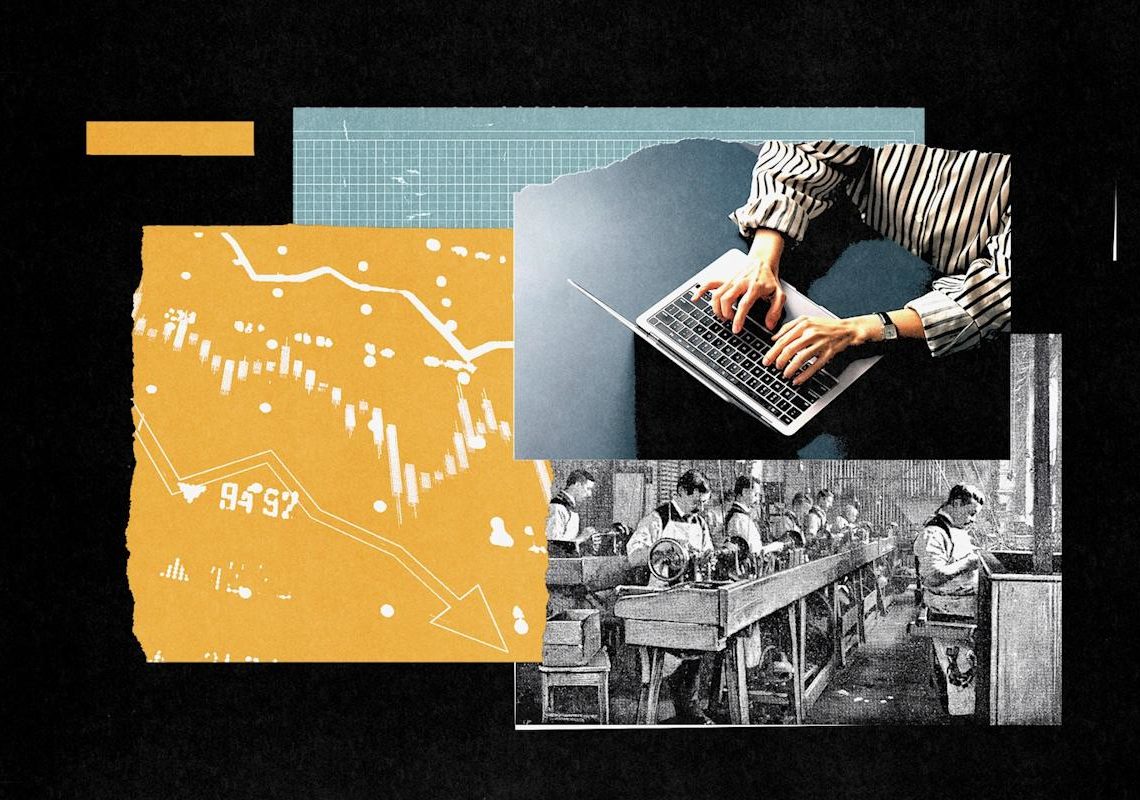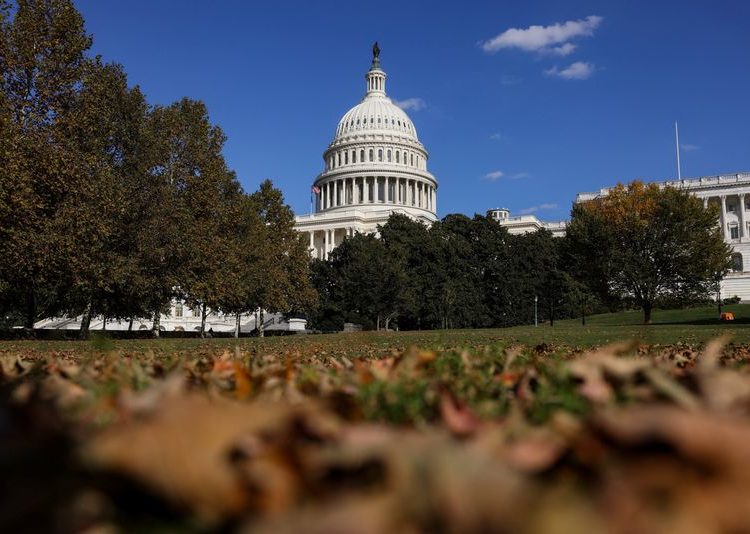Hardly a day passes without word that a major company is increasing its use of artificial intelligence, or a warning that AI will have dramatic impacts – one day – on the U.S. workforce.
Now, some economists warn that a projected slowdown in the U.S. economy could accelerate the trend.
With new reports suggesting that the U.S. economy will probably slow this year, economists and AI experts say more businesses may speed up AI use to cut costs, generate revenue and boost worker productivity. That could lead to more-rapid adoption but also downsides, including job losses and consumer harms.
“Economic downturns spur you to do more,” said Eric So, professor of global economics and management at the Massachusetts Institute of Technology. “There’s a lot of focus on what we can do and not enough questions like ‘Should we do that?’ and ‘Is it being done in a safe way?’”
The Organization for Economic Cooperation and Development estimated on Tuesday that economic growth in the United States will slow to 1.6 percent this year from 2.8 percent, while inflation is set to rise to 3.9 percent by the end of this year. Although trade tensions have cooled somewhat since President Donald Trump announced big tariffs in April, economists worry that higher trade barriers and uncertainty will continue to eat into growth, with some predictions of recession in the coming year.
While a slowdown could encourage more use of AI, there’s also evidence that some companies will pull back on heavy technological investments.
A wide range of companies are increasingly turning to AI regardless of the economic environment. Wall Street firms including JPMorgan Chase and Morgan Stanley are using AI to help boost sales and update legacy code. E-commerce company Shopify and cloud storage start-up Box are requiring workers to use AI regularly in their work to boost productivity and results. Social media firm Meta plans to automate risk assessment as it relates to the privacy reviews of its products. IBM, which recently announced job cuts, replaced a couple hundred human resource workers with “AI agents” to do repetitive tasks such as onboarding and scheduling interviews. It said that over the past four years, AI saved the company 40 percent in its HR budget.
Dario Amodei, CEO of billion-dollar AI start-up Anthropic, received attention last week for suggesting that half of all white-collar entry-level jobs may be eliminated by AI within five years.
Most people “are unaware that this is about to happen,” Amodei told Axios. “It sounds crazy, and people just don’t believe it.”
College graduates may already be losing jobs to AI, according to a report last month from the global economic advisory firm Oxford Economics. The unemployment rate for recent college graduates has risen 1.6 percentage points since mid-2023, nearly triple the increase of the national unemployment rate.
“There are signs that entry-level positions are being displaced by artificial intelligence at higher rates,” Matthew Martin, Oxford Economics senior economist, wrote in the report, while noting that some of the change may be normal.
Since the debut of OpenAI’s ChatGPT in late 2022, companies have been relatively slow in their adoption of generative AI. About 8.7 percent of U.S. companies used AI to produce their products and services in the two weeks between April 21 and May 4, up from 4.8 percent a year earlier, according to the Business Trends and Outlook Survey conducted by the U.S. Census Bureau. ChatGPT, meanwhile, has more than 400 million weekly active users. (OpenAI has a content partnership with The Washington Post.)
AI’s broader use could save companies money but also more quickly expose some of the downsides of the services, especially when they struggle with accuracy or have biases, experts say. That could be especially problematic in fields like medicine, finance and law, said Columbia Business School professor Laura Veldkamp.
“When we have tech shifts, you will get things right and wrong,” said Veldkamp, whose research explores how companies’ use of AI affects the macroeconomy. “As the tech grows up, it goes through a painful stage. We have to get through that to hone the benefits from it.”
Another impact will probably be job displacement, experts say. So far, companies have mostly touted AI as a tool to aid human workers. But as the tech gets better and budgets get tighter in a slowing economy, companies may be more willing to outsource work to AI, slowing hiring or even cutting jobs, experts say. Klarna, a Swedish fintech company, said AI helped it lower vendor expenses, increase internal productivity and better manage operations with fewer employees (the company reduced head count by 38 percent from 2022 to 2024), according to filings made with the Securities and Exchange Commission in March. It has since suggested it went too far in cuts and is hiring more people.
“The hope is that AI will be utilized to improve work and productivity and create new work,” said Mark Muro, a Brookings Institution fellow who has studied AI and its impacts. “But there’s no guarantee.”
Historically, automation has been one solution for labor cost-savings during difficult economic conditions, Muro said. In some cases, investments in automation allow companies to cut costs through head count reduction. When consumer demand falls, companies can take time to make a big technological switch that would have been too disruptive in the regular course of business, Veldkamp said.
An AI revolution has the potential to impact a wide range of industries – from customer service to health care to financial services and beyond – because the technology is able to do tasks such as data-crunching, research and writing that are part of white-collar work. And it comes at a lower cost than some previous technological revolutions like automating a manufacturing facility with machines, Veldkamp said.
Microsoft recently found that some companies are considering using AI to reduce head count in the next year or so, according to a study it conducted. But more of them aim to maintain head count and retrain their workforce.
“You have a class of companies going all in and reinventing themselves with AI,” said Colette Stallbaumer, co-founder of Microsoft WorkLab and general manager of Microsoft 365 Copilot. “But you’ve also got a lot of companies and enterprises still figuring it out. It’ll still take time, and every company is going to be different.”
Economic strain may lead some companies to delay AI investments, deeming the risks to be higher than the rewards, said Brett House, an economics professor at Columbia Business School.
“If there’s uncertainty, it’s not clear there’s a market, or you can’t determine the prices of your goods, it puts a huge chill on investing in any tech,” he said. “Companies that are cash-constrained, have thin margins or a smaller labor component may just pull back on investment to preserve their current business model.”
Recent earnings reports from two Big Tech companies suggest that a slowdown in the economy is spurring them to rethink their aggressive spending. Microsoft, which has been pouring money into AI, reported that it’s spending $1 billion less in capital expenditures from the previous quarter, though that still amounts to $21.4 billion. The company also recently said it is “slowing or pausing” some early-stage data center projects, which are needed to power AI. Amazon Web Services is reportedly pausing some of its data center leasing discussions, particularly international ones, according to a recent note from Wells Fargo analysts citing economic uncertainty. (Amazon founder Jeff Bezos owns The Washington Post.)
Big technological shifts like AI take time, many economists say. AI might move faster given how quickly companies can roll it out, but the shift won’t be overnight, Veldkamp said.
As the technology develops, new jobs will probably also emerge, even ones that aren’t yet imaginable, say experts. Five years ago, few would have heard of prompt engineers – those who specialize in crafting effective prompts for AI bots. But there will be a period in which some roles either disappear or decrease in quantity before new jobs are created. Government data may already indicate that computer programmers are feeling the squeeze, Muro said.
“This is all new. We haven’t gone through a down economy with a technology at this early stage, so it’ll be interesting to see how this plays out,” he said.
Related Content
To save rhinos, conservationists are removing their horns
Donald Trump and the art of the Oval Office confrontation
Some advice from LGBTQ elders as WorldPride kicks off amid fears
The post Why your job may face a double threat if the economy sours appeared first on Washington Post.




